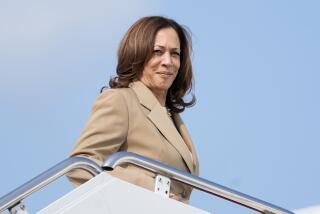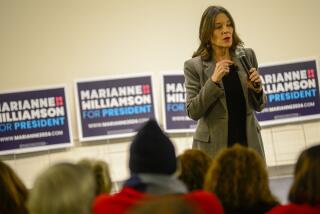CAMPAIGN ’96 : GOP Hopefuls Wage War of Words
- Share via
MANCHESTER, N.H. — Bob Dole is running against Patrick J. Buchanan and extremism. Buchanan is running as the champion of conservatism and middle-class economic anxiety. Lamar Alexander is running as neither of the above, and Steve Forbes is trying to make a fresh start.
In the chess match of presidential politics, this is how the end game between the major candidates is unfolding in New Hampshire, with the Republican nomination in the balance. And just as chess players use their bishops and rooks to trap their foes, the GOP contenders are relying on their ads and rhetoric to define the campaign in terms they believe will undercut their opposition and give them a decisive advantage.
At times, this exercise is infused with Machiavellian subtlety. Thus, Dole’s new attack on Buchanan as “too extreme,” unveiled in a television commercial the day after Buchanan’s strong second-place finish in Monday’s Iowa caucuses, is not really aimed at the conservative commentator’s supporters, whose loyalty is unlikely to be shaken by such barbs, Republican professionals say.
Rather, it is assumed that Dole strategists are hoping their ad resonates with undecided voters--as well as backers of Alexander and Forbes--and frightens them into believing they must vote for the Senate majority leader in order to stop Buchanan from winning the New Hampshire primary and taking control of the GOP race.
But this is a risky business, points out GOP strategist David Keene, erstwhile advisor to the Reagan, Bush and 1988 Dole presidential campaigns. By attacking Buchanan, Keene said, “Dole leaves himself open to a negative backlash, which might let Alexander sneak up on him and finish first.”
Keene and others believe such a scenario would be an extension of what happened in Iowa. There, Dole’s commercials attacking Forbes as inexperienced helped send the wealthy publisher’s support plummeting. But they apparently helped boost Alexander, who offered himself as the “above-the-fray” candidate. The former Tennessee governor finished third, only 8 percentage points behind Dole.
Why is Dole taking such a chance? The answer, analysts here say, is that he decided he had little choice because of the momentum Buchanan gained from his Iowa showing. As of Thursday, Buchanan was tied with Dole in some opinion surveys. And Dick Bennett, head of a local independent polling firm, says the trends as of the first part of this week had the potential to carry the former Nixon and Reagan White House aide to victory in Tuesday’s primary.
According to Bennett, these trends showed Buchanan not only holding his base among conservatives, but also expanding it with his message of concern about middle-class economic insecurity. “Last night [Wednesday], he began to peel off men below [age] 50, some of whom hold two jobs, who are worried about the future,” Bennett said.
But Buchanan’s effort to get across his economic message may have been seriously hampered Thursday when his campaign’s co-chairman, Larry Pratt, stepped aside amid reports that he had addressed meetings organized by white supremacists and right-wing militia leaders. The controversy likely will make it that much harder for Buchanan to effectively refute Dole’s “extremism” charge.
Before Pratt surfaced as an issue, Buchanan had taken a relatively low-key approach in responding to Dole’s attack. In an ad aired solely on radio, Buchanan denied Dole’s claim that he had advocated arming South Korea, Japan and Taiwan with nuclear weapons. Buchanan reiterated that denial during a debate among the candidates Thursday evening.
Buchanan was also preparing a new ad in which he does not refer to any of his rivals, but instead claims that only he among the remaining GOP contenders “fought every tax hike of the last 15 years.”
“Dole is trying to throw us off our message,” said Terry Jeffrey, Buchanan’s campaign manager, “and he’s not going to do it.”
Even while focusing on Buchanan, the Dole campaign is not ignoring Alexander. A Dole ad questions his commitment to social conservatism, asking: “How liberal is Lamar Alexander?”
For his part, Alexander is seeking to depict himself as a younger, more imaginative version of Dole, in hopes of capturing backing among moderate Republicans. Alexander has also been patting himself on the back for supposedly avoiding negative campaigning.
“We’d have a much better New Hampshire primary . . . if all of us would junk the negative ads and focus on where we hope our country goes and what we have to say about ourselves,” he said at one rally this week.
But even as he spoke, one of his ads was targeting Dole and Forbes, labeling the senator “a Washington insider all his life,” and the publisher “a Wall Street insider for 35 years.”
The ad’s narrator describes Alexander as being “better prepared than Forbes,” and having “fresher ideas than Dole.”
But Alexander’s fundamental problem, analysts say, is that he doesn’t generate much enthusiasm, even among his own backers.
“He seems like the least crazy of the ones who are out there,” said Laurie Wake, a beautician who attended a rally in Milford, N.H., and described herself as leaning toward him. “He seems like a more ordinary, levelheaded person; he doesn’t seem like he would be a scary person to have in office.”
But some analysts doubt whether such feelings are strong enough to give Alexander a victory here; they question whether he will finish ahead of Forbes.
Although Forbes hurt himself here with negative ads that his campaign has withdrawn, pollster Bennett says he could bounce back. “The people who liked him in the past still like him,” he said.
He added that Forbes’ flat-tax plan and message of economic growth, which is more specific than Alexander’s pledge to create a “rising, shining America,” give him potential to gain new support.
More to Read
Get the L.A. Times Politics newsletter
Deeply reported insights into legislation, politics and policy from Sacramento, Washington and beyond. In your inbox twice per week.
You may occasionally receive promotional content from the Los Angeles Times.









